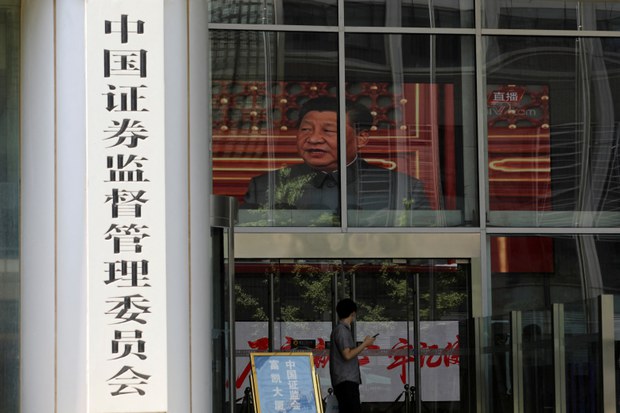China replaces top regulator as it attempts to end stock market rout
Share

A man stands near a screen showing news footage of Chinese President Xi Jinping at the China Securities Regulatory Commission (CSRC) building on the Financial Street in Beijing, China, July 9, 2021.
The Chinese cabinet has appointed a former Shanghai vice mayor and markets veteran Wu Qing as chairman of the China Securities Regulatory Commission, replacing Yi Huiman, in an apparent attempt to bring the stock markets out of a downturn as public outrage grows.
Wu, known as the “broker butcher” in the industry for his crackdowns on traders, was previously chairman of the Shanghai Stock Exchange between 2016 and 2017 until he was elevated to vice mayor of Shanghai.
He worked with financial regulators, including at the China Securities Regulatory Commission, or CSRC, for more than two decades.
The CSRC announced the reshuffle in a statement Wednesday without giving reasons for the change. The move came after the stock market dropped to a five-year low Monday amid a slumping economy. Yi was made chairman of the regulatory body in 2019.
Chinese authorities intervened in the market this week by injecting funds to stem a freefall of stocks and flight of outflows. On Tuesday, A shares rebounded after a unit of the sovereign wealth fund publicly pledged its endorsement of the market’s valuation and expanded its holdings of exchange-traded funds (ETFs) that track the performance of China’s benchmark indexes.
Separately, media reports said the “national team” – Beijing-charged fund managers – has been in action, pouring money into China’s five largest ETFs tracking the CSI 300 Index and the Shanghai Composite Index. They received a net inflow of US$20.2 billion in January, an amount which is over 10 times last year’s monthly average.
There is still a lot of ground to make up with 3 trillion yuan (US$422 billion) wiped from the Shanghai and Shenzhen stock markets since the end of last year, according to estimates by analysts at the Chung-Hua Institution for Economic Research in Taiwan.
The CSRC also held a special meeting on Monday to improve the investment value of listed companies, urging these public firms to proactively increase returns to boost investor confidence. Tactics available in the “toolbox” include share buybacks, major shareholders increasing their stakes, regular dividend payouts, mergers and restructuring, as well as strengthening communications via road shows and briefings.
Better tomorrow?
China is also talking up the economic environment that experts say is the root of the problem, as the stock market is a gauge of prospects and investors’ expectations. The stock market has been roiled by frequent turmoil in the past few years, weighed down by a real estate crisis characterized by defaults and Beijing’s crackdown on sectors like technology and private tuition services.
“It’s now a matter of confidence. A very important issue in the financial market is trust and confidence,” said Wang Shiow-Wen, an assistant research fellow at Taiwan’s Institute for National Defense and Security Research, in an interview with Radio Free Asia.
“Trust means that after I invest my money, you won’t eat me up. Confidence means believing that profits can be made in the long run.”
Wang expects that there will be a point in the short term where investors will sell and cut losses.
“So China has been releasing news that their future market is very good, but is that true? I don’t know.”
Cheng Cheng-Ping, a finance professor at the National Yunlin University of Science and Technology in Taiwan, called China’s rescue efforts, including the latest measure to curb short-selling, “outrageous” from a Western capital market perspective.
“How can any regulatory agency ask for private and listed companies’ returns on investment?” Cheng said, pointing out that this should instead be the concern of corporate leaders and shareholders.
Furthermore, shareholders and investors won’t simply rely on numbers like returns and earnings per share to evaluate a company.
“There are other indicators like inventory, raw materials and, overseas markets and emerging technologies. Investors have many considerations when investing, and the overall situation in China is very bad,” Cheng said.
Translated and additional reporting by RFA staff. Edited by Mike Firn and Taejun Kang.







